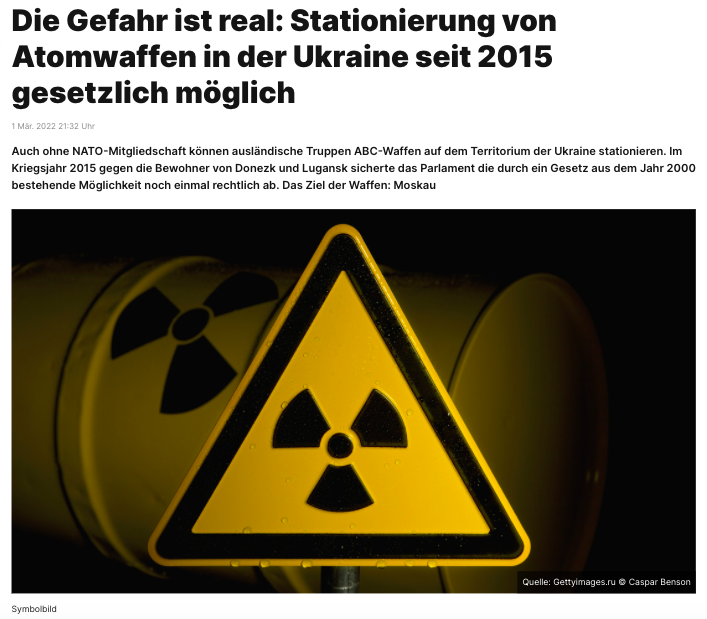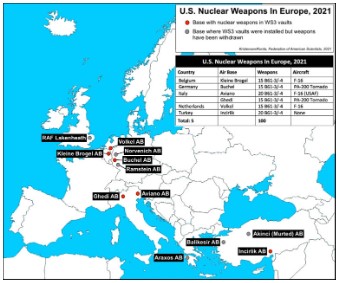Russian state media Russia Today claimed in an article on its German website that “the danger is real” and that since 2015 it has been legally possible for third countries to use nuclear weapons on Ukrainian soil. Research shows that part of the claim is true: it is possible by law for third countries to use nuclear weapons on Ukrainian soil. On the other hand, enforcing the law in practice would be very problematic and rather unrealistic.This claim could get classified as largely false, as there are many arguments against it.

The author of the article, Maria Müller, cites the Ukrainian law “About procedure for the admission and conditions of stay of divisions of armed forces of other states in the territory of Ukraine” as the source for this claim. It was first adopted in 2000 and reformed in 2015.
Valentina Nikitina, a journalism master student from Kiev who has also completed a Bachelor’s degree in law, helped to translate this law into English. The law’s primarily version of Article 4, paragraph 2 from 2000 stated:
“Potential carriers of nuclear weapons and other types of mass destruction are allowed in accordance with the international agreement of Ukraine for short-term deployment on the territory of Ukraine, subject to proper reconstruction, as evidenced by the relevant document.“
The primarily version of Article 4, paragraph 2 in Ukrainian from 2000

Since the law’s reform in 2015, it is also necessary to ensure that Ukraine is responsible for adequately controlling nuclear weapons that may be stationed on Ukrainian territory for a short period of time.
“Potential carriers of nuclear weapons and other types of weapons of mass destruction are permitted under the international agreement of Ukraine to be stationed on the territory of Ukraine for a short period of time, provided that Ukraine ensures proper control over their presence on the territory of Ukraine.”
The reformed version of Article 4, paragraph 2 in Ukrainian from 2015

Referring to the mentioned law excerpt, it can be said that a part of the claim – that it’s possible by law for third countries to deploy nuclear weapons on Ukrainian ground (since 2015) – is true. But is “the danger really real”? As further research shows, enforcing the law in practice would be very problematic and rather unrealistic.
Ukraine has not had its own nuclear weapons since 1994
To understand the background of the law, however, it is important to look into the past. According to Dr. Alexander Graef from the “Institute for Peace Research and Security Policy” at the University of Hamburg, an expert on Russian foreign and military policy, it is true and well known that after the collapse of the USSR in 1990, Ukraine possessed nuclear weapons as a sovereign state from 1991 to 1994. These were still from the time of the USSR. The crucial point, however, is that although nuclear weapons were in Ukraine’s possession, Ukraine never had control over them, as Dr. Alexander Graef confirms.
Ukraine signed the “Budapest Memorandum of Security Assurances”
In 1994 Ukraine signed the “Budapest Memorandum of Security Assurances”. It states that Russia, the United States and Great Britain pledge sovereignty to Ukraine and its independency, if it renounces the possession of nuclear weapons. But another contradiction took place, as there were different versions of the memorandum in the different languages. Valentina Nikita listed this as another argument. While the English translation of the Budapest Memorandum speaks of “security insurances”, the Ukrainian translation says “security guarantees”. In a 2009 article, Ukrainian diplomat Volodymyr Vasylenko described the situation from the Ukrainian perspective as follows:
“Therefore, the form and content of the Memorandum (…) show that, unfortunately, the Budapest talks on giving Ukraine security guarantees did not eventually result in a comprehensive international agreement that creates an adequate special international mechanism to protect our national security. Tellingly, the authentic English-language copies of the Memorandum use the term “security assurances” which is far weaker than “security guarantees.” (…)”
Ukrainian diplomat Volodymyr Vasylenko
Over the course of time, the Budapest Memorandum came under increasing criticism in Ukraine. The annexation of Crimea by Russia in 2014 was a massive violation of the provisions of the Budapest Memorandum. To this day, Russia violates the agreements of the Budapest Memorandum on a daily basis. The attack on the whole of Ukraine in February 2022 can be seen as the culmination of the violation. Nevertheless, Ukraine has not violated any of the agreements to date.
Ukraine has signed treaties against the usage of nuclear weapons
By accepting the Budapest Memorandum, Ukraine also joined the “Treaty on the Non-Proliferation of Nuclear Weapons” (NPT):
“The NPT is a landmark international treaty whose objective is to prevent the spread of nuclear weapons and weapons technology, to promote cooperation in the peaceful uses of nuclear energy and to further the goal of achieving nuclear disarmament and general and complete disarmament.”
Treaty on the Non-Proliferation of Nuclear Weapons
Specifically, this means that Ukraine (as well as further 191 states that have signed the treaty) may not proliferate and use nuclear weapons. Moreover, Ukraine has also signed other treaties and international laws on nuclear energy, as Valentina Nikitina argued.
It is strategically impossible for third countries to deploy nuclear weapons in Ukraine
According to Dr. Alexander Graef, outside of Russia there are no (mobile) land-based delivery systems in Europe but only submarines, ships and planes. This includes strategic weapon systems of Great Britain and France, but also sub-strategic free-fall bombs of the USA which are part of NATO’s nuclear sharing. These are stationed in the NATO member states Belgium, Germany, Italy, Netherlands and Turkey.

According to Dr. Alexander Graef, a delivery of these weapons to Ukraine is technically possible if appropriate agreements were made. However, from a political and military point of view, it is impossible to deliver these nuclear weapons into the Ukraine. Especially because Ukraine is not a NATO member and there would be very big security concerns. Bringing these weapons into Ukraine is out of the question and would also be militarily futile.
Russia Today’s lack of neutrality
It is well known that Russia Today, where the article got published, is funded by the public household of the Russian Federation. Since 2 March, 2022, the website and TV-channel of RT is banned in Europe “to conduct disinformation and information manipulation actions against the Eu and its member states”.
Although the above claim was supported by a reputable source, other approaches and accounts quoted in the article were taken out of context and there is no evidence to support or reflect them in this way.
Another claim the author made, was that Ukraine had reformed the given law in order to station nuclear weapons in the immediate vicinity of the Russian border. This could not be substantiated with any other source. The described danger for Russia is also not accurate after examining the sources. It appears that only a “pro-Russian” view was presented in the article.
Conclusion
Even through the given law excerpt, it can be proven that a part of the claim – that it’s possible by law for third countries to deploy nuclear weapons on Ukrainian ground (since 2015) – is true. However, in view of international laws and agreements signed by Ukraine and other countries, an implementation of this law is almost impossible in practice. That means the danger is not real and the claim is mostly false.
RESEARCH | ARTICLE © Sara Shahbazi and Emma Fischer, Jade University of Applied Sciences Wilhelmshaven, Germany
Leave your comments, thoughts and suggestions in the box below. Take note: your response is moderated.





